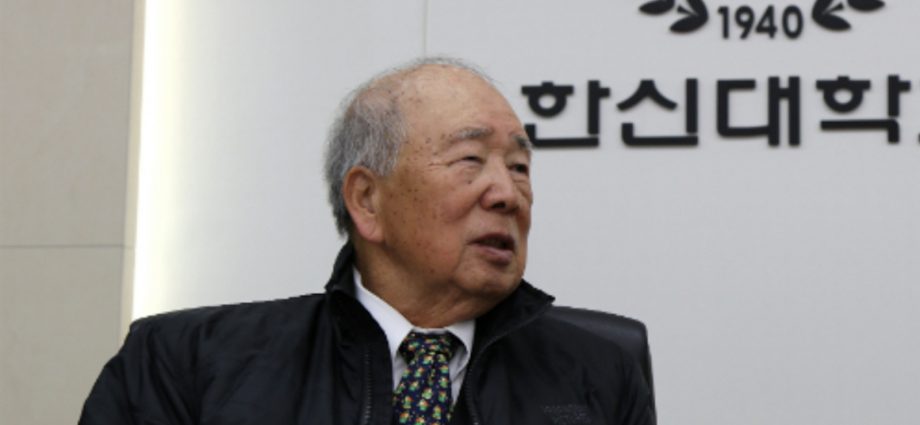Much used to be made of the fact that the man who became known as Kim Il Sung had been named Kim Song Ju at birth.
Kim Il Sung was his nom de guerre, acquired in the 1930s in Manchuria. Some reports suggested that other anti-Japanese figures before him may have called themselves Kim Il Sung, and that something of a guerrilla legend had grown up around the name.
On that basis, critics in South Korea and elsewhere charged that the man who ruled North Korea for just under half a century was a mere imposter who had never been a guerrilla hero at all. The skepticism thus engendered abroad – amplified by Kim’s own tendency to obvious self-promotion and prevarication – tended to apply indiscriminately to all his achievements real and imagined.
That was the way the South Korean government wanted Kim to be viewed. Thus, to sketch a more realistic image of North Korea’s founding leader it took a relative outsider, Dae-Sook Suh, a Korean-American scholar. Suh died last week in California at 90, recognized in South Korea and abroad as a giant among the first generation of North Korea watchers.
Suh wrote in a 1967 book that the Kim Il Sung who became North Korea’s leader “undoubtedly received or inherited some of the credit due to other revolutionaries, but the rumors around his name are the consequence of his own success. Prior to his accession and consolidation of power in the North, Kim Il Sung, with his own record, was well known to the Japanese police…. He is certainly not a nonentity who inherited everything from the legendary patriot.”
To come up with that and countless other insights into tightly closed North Korea, Suh, while spending most of his career as a political science professor at the University of Hawaii, collected and plowed through an enormous stash of original materials in the various languages of Northeast Asia. In 1988 he published a full biography of Kim. Ultimately he donated his research collection to two repositories in South Korea.

Among successor researchers his achievement inspires awe: “My biggest impression of him was visiting his book collection, which he had donated to Hanshin University,” Fyodor Tertitskiy, author of Kim Il Sung: An Accidental Tyrant, told Asia Times.
“One could clearly see how hard it was to do research back in the day – with no internet, no e-books, no automated search and no access to the Communist bloc materials. All these scarce materials had to be collected in person,” he said.
Suh had done his research for the biography before Soviet and Chinese internal documents became readily available, Tertiskiy, a researcher at Seoul’s Kookmin University, notes. “For something written in the Cold War era, it is a remarkable piece of research.”
Suh’s know-your-enemy scholarship was by no means slanted to portray Kim and North Korea in a flattering light. Quite to the contrary, he went into great detail to expose their lies and major failures of policy. He managed to make the governments of both North and South Korea unhappy with him.
Suh was under no illusion that the sort of “unification” sought consistently by the North would prove to be in the interests of the South, and his views have conflicted with the policies of recent leftist Seoul governments.
“He was far enough ahead of his time in taking an intellectually honest approach to the inter-Korea issue that today’s South Korean government is still struggling to catch up with him,” says Denny Roy, a senior researcher at Honolulu’s East-West Center.
Suh and a pair of fellow first-generation scholars, Robert A Scalapino of Berkeley and Chong-Sik Lee of Penn, both also now deceased, were so tough on the North that a newer cohort of left-leaning, Vietnam War-influenced Pyongyang-watchers – sometimes called “revisionists” as their interpretation of history was far more sympathetic to the North – denounced them for “Cold War scholarship.”

The opening up of Soviet and Chinese sources three decades ago tended to validate the work of Suh and the other orthodox, first-generation scholars, even as it cut considerable ground out from beneath the Korea revisionists’ theories.
Maurice Suh of Los Angeles, one of Dae-Sook Suh’s two sons, told Asia Times that his father had been born in North Korea and had spent his childhood there before moving to the South Korean capital, Seoul, as one of the estimated one million northerners who migrated southward following the communist takeover in the North.
From Seoul, Suh moved to the United States for studies that culminated at Columbia University, where he earned his PhD.
Bradley K. Martin is the author of Under the Loving Care of the Fatherly Leader: North Korea and the Kim Dynasty.

